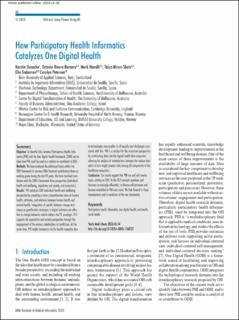| dc.contributor.author | Denecke, Kerstin | |
| dc.contributor.author | Romero, Octavio Rivera | |
| dc.contributor.author | Merolli, Mark | |
| dc.contributor.author | Miron-Shatz, Talya | |
| dc.contributor.author | Petersen, Carolyn | |
| dc.date.accessioned | 2024-01-03T17:14:27Z | |
| dc.date.available | 2024-01-03T17:14:27Z | |
| dc.date.created | 2023-12-26T12:00:56Z | |
| dc.date.issued | 2023 | |
| dc.identifier.citation | Yearbook of Medical Informatics. 2023, 32 (1), 48-54. | en_US |
| dc.identifier.issn | 0943-4747 | |
| dc.identifier.uri | https://hdl.handle.net/11250/3109639 | |
| dc.description.abstract | Objective: To identify links between Participatory Health Informatics (PHI) and the One Digital Health framework (ODH) and to show how PHI could be used as a catalyst or contributor to ODH.
Methods: We have analyzed the addressed topics within the ODH framework in previous IMIA Yearbook contributions from our working group during the last 10 years. We have matched main themes with the ODH's framework three perspectives (individual health and wellbeing, population and society, and ecosystem).
Results: PHI catalysts ODH individual health and wellbeing perspective by providing a more comprehensive view on human health, attitudes, and relations between human health and animal health. Integration of specific behavior change techniques or gamification strategies in digital solutions are effective to change behaviors which address the P5 paradigm. PHI supports the population and society perspective through the engagement of the various stakeholders in healthcare. At the same time, PHI might increase a risk for health inequities due to technologies inaccessible to all equally and challenges associated with this. PHI is a catalyst for the ecosystem perspective by contributing data into the digital health data ecosystem allowing for analysis of interrelations between the various data which in turn might provide links among all components of the healthcare ecosystem.
Conclusion: Our results suggest that PHI can and will involve topics relating to ODH. As the ODH concept crystalizes and becomes increasingly influential, its themes will permeate and become embedded in PHI even more. We look forward to these developments and co-evolution of the two frameworks. | en_US |
| dc.language.iso | eng | en_US |
| dc.publisher | Georg Thieme Verlag KG | en_US |
| dc.rights | Attribution-NonCommercial-NoDerivatives 4.0 Internasjonal | * |
| dc.rights.uri | http://creativecommons.org/licenses/by-nc-nd/4.0/deed.no | * |
| dc.subject | participatory health informatics | en_US |
| dc.subject | one digital health | en_US |
| dc.subject | one health | en_US |
| dc.subject | social media | en_US |
| dc.title | How Participatory Health Informatics Catalyzes One Digital Health | en_US |
| dc.type | Peer reviewed | en_US |
| dc.type | Journal article | en_US |
| dc.description.version | publishedVersion | en_US |
| dc.rights.holder | ©2023 IMIA and Georg Thieme Verlag KG | en_US |
| dc.subject.nsi | VDP::Medisinske Fag: 700::Helsefag: 800 | en_US |
| dc.source.pagenumber | 48-54 | en_US |
| dc.source.volume | 32 | en_US |
| dc.source.journal | Yearbook of Medical Informatics | en_US |
| dc.source.issue | 1 | en_US |
| dc.identifier.doi | 10.1055/s-0043-1768727 | |
| dc.identifier.cristin | 2217555 | |
| cristin.ispublished | true | |
| cristin.fulltext | original | |
| cristin.qualitycode | 1 | |

